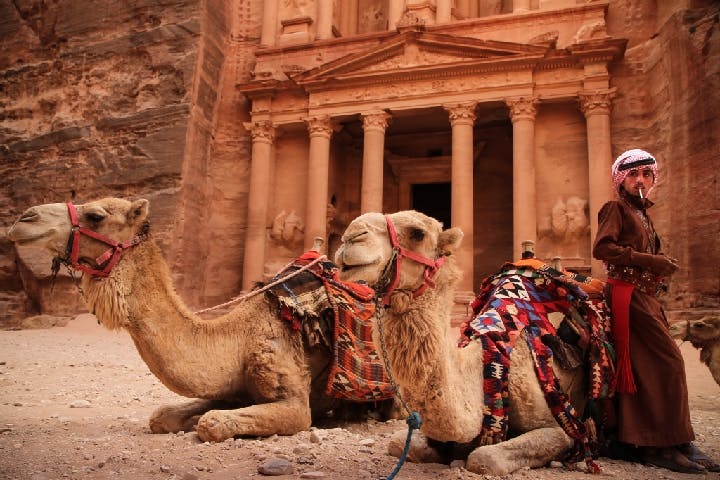Surrounded by war, can Jordan’s tourism industry survive?
– Maya Wesby
Tensions and bloodshed in the Middle East have scared away scores of tourists from Jordan’s safe borders. What does this mean for the nation’s tourism-dependent economy, and how will it recover, if it can?
With the Israeli/Palestinian conflict to its west, the Syrian Civil War to the north, and ISIS’s rampage in the east, Jordan has been relatively stable, a sanctuary encircled by intense and years-long warfare.
The horrendous nature of war plagues the economic and political stability of all nations, regardless of direct involvement. Jordan is no exception. Feuding between Iraqi powers and Sunni tribes prompted the partial closure of the Jordanian-Iraqi border, triggering the collapse of trade between the two nations. The Syrian conflict has mostly cut off overland trade between Jordan and Europe, sinking Jordan’s economy.
Less discussed is the impact of regional turmoil on Jordan’s tourism sector, which comprises about 13 percent of the nation’s $34 billion economy. While an estimated 8 million tourists visited Jordan in 2010, by 2014 that number had dropped to below 3 million. Popular sites, like Petra (the UNESCO World Heritage site found new marketability after being featured in Indiana Jones and the Last Crusade) and Jerash (a well-preserved city from the Roman Empire, where one can see ancient marks from chariot wheels in the pavement), receive only a small fraction of visitors compared to the hundreds of thousands that came annually before the ascendancy of ISIS.
The tourism industry is 13% of Jordan’s national economy.
Despite all of this, Jordan’s economy has been doing relatively well compared to the rest of the Middle East, and is set to grow at more than 3 percent this year while its neighbors’ economies barely grew at all. The economic reforms of King Abdullah II have made headway, but they are not enough to fix the high unemployment rate that disproportionately plagues the nation’s youth. In the desperation and frustration of their tattered lives, radicalism has an appeal and sets the region further down the death spiral of destabilization, destruction, and deprivation.
The steady improvements in Jordan’s economy are not enough for those working in the hotel industry, where many establishments have scaled back on staff and services, if not closed operations completely. Yassar al-Majali, the manager of the Jordan Hotel Association, spoke with the New York Times and acknowledges that even among the tourists who do visit the country, few stay overnight.
These prospects threaten the success of the Shepherd, a hotel owned by Nader Shalhoub and his family. While their business has experienced slow periods of revenue during previous conflicts, from Jordan’s 1970s civil war to the 2003 invasion of Iraq by the United States, the hotel has lingered around only 20 percent occupancy for the past few years, leaving the business vulnerable to collapse. While Jordan does not have the high-scale violence of its neighbors, foreigners see it as a dangerous nation. “Now we are considered a war zone,” Shalhoub says, “and when you’re a war zone, you’re not a tourist zone.”
Still, many native Jordanians consider wars in other countries an opportunity, despite its detrimental impact on their economy. Thiab Atoom, a business owner who believes Jordan should take advantage of the conflicts, told the New York Times, “Nobody is going to Yemen, Syria or Iraq. This … should also be an opportunity to say, ‘Jordan is a haven; come here!’ But we aren’t doing enough to lure in visitors.” Residents and business owners lay blame on fellow Arab nations for scaring away tourists, the Jordanian government for not doing enough to try and attract foreigners, and the international community for not doing enough to stop Middle Eastern crises.
Despite the criticism, the Jordan Tourism Board is making strides to attract more tourists. With the help of the government, the Board is trying to lure foreign visitors. Some are drawn by promises of price cuts and waived airport fees, others come to seek adventure or religious fulfillment. And there are also those who feel less threatened by the surrounding chaos. “The problem is not in Jordan,” states Nayef Al-Fayez, the Minister of the Board. “The problem is with the misperception.”
* * *
The Sources: Michael Pizzi, “Surrounded by fire, Jordan’s tourists scared away,” Al Jazeera America, June 11, 2015.
Donna Abu-Nasr, “Even Indiana Jones Can’t Shield Jordan From Middle East Fighting,” Bloomberg, April 22, 2015.
The Associated Press, “Ancient Petra Sees Few Visitors as Jordan Tourism Declines,” New York Times, March 30, 2015.
Photo courtesy of Flickr/Pablo Pecora
